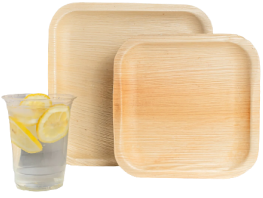Composting At Home?: Here's What You Need To Know

If you are one to follow sustainability, we bet you must have heard about composting. In a nutshell, composting is a process where organic matter, like vegetable peels and food scraps, decomposes into the soil.
How's that any different from biodegradation? To start with, all compostable products decompose faster than biodegradable products. Moreover, unlike biodegradable products that simply break down into smaller particles, compostable products actually break down within 180 days and nourish the soil.
Simply put, biodegradable products do not benefit the soil. Plus, all compostable products are certified to be labeled as compostable.
With that in mind, composting your products is pretty simple. In fact, it can be a fun, rewarding activity that is also good for the planet. And, if you are to get started on this, here's a complete guide to composting.
What is Composting?
Let's get started with what exactly this buzzword means. Simply put, compost is organic matter that breaks down and nourishes the soil. In short, compost offers all the nutrients a plant requires to grow.
Compostable material can be easily found in your household. Some materials include food scraps, yard trimmings, leaves etc.
Here's why you should compost:
- Reduced Waste: When you compost your waste, you generate less waste. Instead of your food scraps ending up in a landfill, you can simply toss them in your yard, reducing food waste.
- Soil Nourishment: Compostable materials break into the soil, offering nourishment and moisture. It helps prevent soil erosion by breaking up compact soil.
- No More Synthetic Fertilizers: Unlike synthetic fertilizers, compostable products are 100% natural. They don't contain any chemicals.
- Planet-Safe: If you use compostable products like compostable single-use plates, you can reduce your reliance on plastic. Also, unlike plastic, which takes forever to decompose, compostable plates break down into the soil within just 180 days.
What's Compostable and What's Not?
Not every product is compostable. Therefore, before you get started on backyard composting, you must know what's compostable and what's not.
What's Compostable?
Mostly, all organic materials are compostable. Here are some of them:
- Vegetable and fruit scraps or peels
- Rotten vegetables and fruits
- Plant trimmings
- Coffee filters
- Tea leaves
- Eggshells
- Hair and animal fur
- Paper
- Unused toilet paper and paper towels
- Flowers
- Sandust
- Wood chips
What's Not Compostable?
Stating again, not all items in your kitchen are compostable. Here are some of the materials that aren't compostable:
- Pet waste
- Scraps and bones from meat or fish
- Dairy products
- Walnuts
- Leaves from walnut trees
- Charcoal
- Huge pieces of wood
- Oil and grease
- Coffee pods
- Baked goods
- Infected plants
How To Start Composting?
Contrary to how complicated it might sound, composting in your homes is pretty easy.
Here's a step-by-step guide to composting:
Creating a Compost Pile
To get started, you must choose a designated area where you can place your compost pile. Make sure the area is located outdoors with enough shade and proper drainage. In short, the pile must be placed in the open but should be kept away from animals.
Adding Materials
Once you have chosen the location of your pile, start adding materials. When adding material, you can follow "green-brown layering."
In short, green materials are vegetable peels, while brown materials are carbon-rich items like paper or wood chips. While this is unnecessary, it can be a great exercise to optimize the composting process.
Turning The Pile
To ensure optimized composting, use a shovel to turn and rotate the material. This will distribute the moisture evenly. Generally, you should turn the pile once every 4-7 days. However, the duration might vary, depending on the number of materials you are composting.
Technically speaking, the composting time can depend upon several factors like the amount of material added, moisture, air, weather etc. In short, your pile might take one month to compost or even one year to compost.
But, once you notice all the material being broken down into smaller pieces, it's time to use the compost. Mix the compost with potting soil, or simply sprinkle it in your garden.
Composting Without Yard: Is It Possible?
Stating again, composting is easy. So even if you don't have a yard, you can still practice composting. In fact, you might be living in an apartment that offers compost-friendly bins where you can throw your compostable trash.
In short, once you have collected all the compostable material in your household, you can drop these things in your nearby compostable trash can. This trash will then go to the landfill, where the material will break down into simpler pieces on its own.





